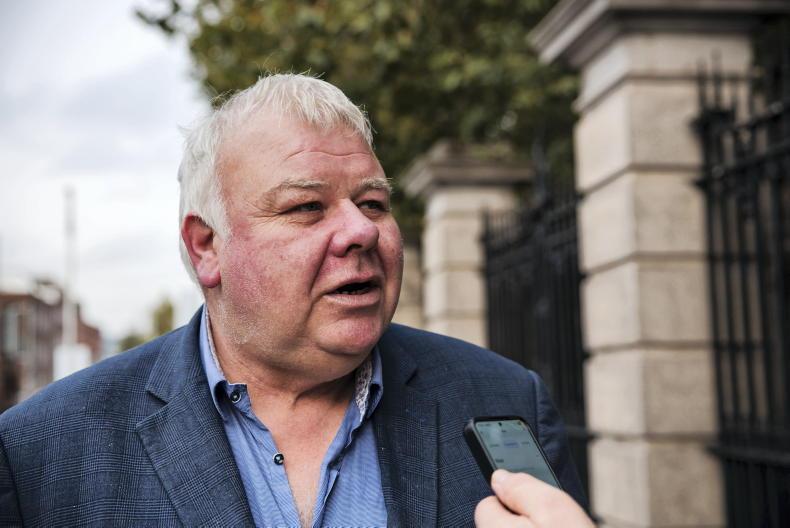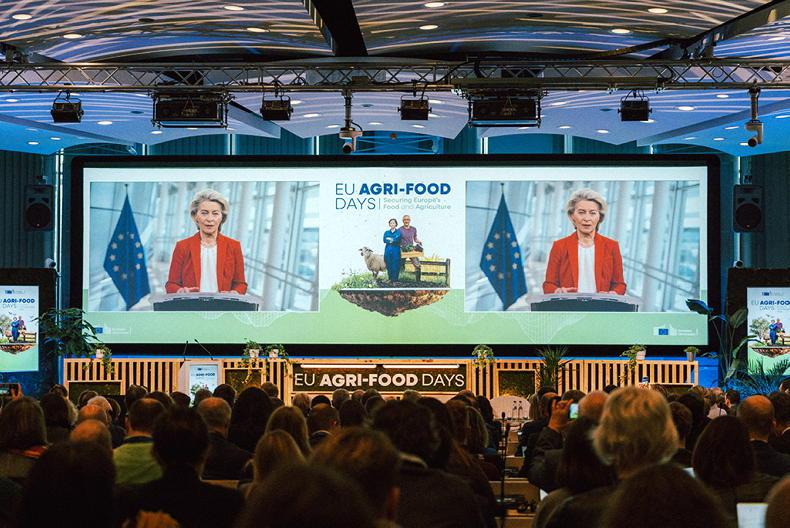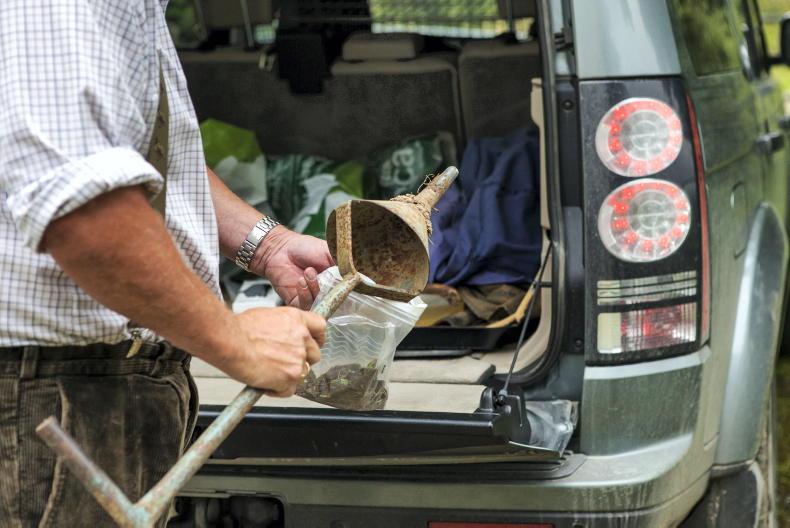Irish farmers on peatlands and wetlands are set to be on the frontline of a cross-compliance battle in the next CAP.
A new Good Agricultural and Environmental Condition (GAEC) is being introduced from 2023 which will impose management practices that provide protection for carbon-rich soils.
These requirements will be part of a beefed-up cross compliance known as “enhanced conditionality” which farmers will have to meet to receive their direct payment.
The European Commission is clear in its recommendations for Ireland’s CAP strategic plan that the deterioration of Irish peatlands must be halted and their restoration encouraged.
It considers these soils to be important stores of carbon and just over 20% of Ireland’s total land area is classified as peatland.
There are concerns that 80% of these soils are degraded having been drained for the purposes of peat extraction, farming and afforestation.
It is estimated that drained peat soils release around 20t of CO2 per hectare per year.
The Commission’s recommendations will be an important reference document when it comes to approving Ireland’s strategic plan.
For the first time in the history of the CAP, our farmland could be differentiated by soil type to receive direct payments
The Department will have to define and map peatlands and wetlands at an individual land parcel level. It will then have to draw up a list of management requirements that may include a ban on drainage and a ban on burning.
It has raised the hackles of farmers in these areas.
The proposals put forward by the Council of Ministers endanger farmers’ way of life, Irish Natura and Hill Farmers’ Association (INHFA) president Colm O’Donnell has said.
“For the first time in the history of the CAP, our farmland could be differentiated by soil type to receive direct payments,” O’Donnell said.
“The Council of Ministers approach supported by our Minister for Agriculture gives member states the flexibility to remove GAEC 2 land from being defined as an agricultural area.”
O’Donnell raised a number of concerns including the absence of a legal definition, similar to that of arable land, for a carbon-rich soil, the potential infringement on farmers’ rights to farm their land, and the singling out of farms based on soil type.
He demanded that Minister McConalogue seek the withdrawal of the council’s amendment.
Derogations not a long-term solution – Fitzmaurice
Offering farmers on peatlands and wetlands a derogation to ensure their land remains eligible for CAP payments is not a long-term solution, Independent TD Michael Fitzmaurice has warned.
Minutes from a meeting held between CAP negotiators obtained by Fitzmaurice detail concerns about the European Council’s GAEC 2 proposals.
The document states that the council has proposed a derogation which would ensure farmers are protected if rules introduced by member states result in land becoming permanently flooded.
The European Parliament is concerned that the council’s proposal will incentivise countries to impose obligations that force farmers to abandon farming these areas.
Amendment
An amendment to the proposals has been tabled by the European Commission to clarify that GAEC 2 should not prevent farmers producing agricultural products on their land.
It would allow farmers to voluntarily set aside their land and remain eligible for payment.
The Commission’s amendment also factors in possible measures in an agri-environmental scheme that go beyond basic cross-compliance requirements.
I’m not doubting the Department at the moment but down the road you don’t know who will be minister
In this case, if land moves out of production for the purposes of the scheme, it can remain eligible for a direct payment.
Fitzmaurice stressed that there were no guarantees such allowances would be available further down the line.
“I’m not doubting the Department at the moment but down the road you don’t know who will be minister. If you got a minister that has a green agenda they may not look for this derogation again.
“Because we need to be clear. It’s a derogation to the member state, not to a farmer. We’ve seen it in water and we’ve seen it with turf. These things come and go.”
Fitzmaurice questioned whether it was part of a wider move under the EU’s Biodiversity Strategy to legally protect 30% of the EU’s land area and have at least one-third of those areas strictly protected.
“Are we going to make a theme park in a cunning way?” he asked.
“We need the minister [McConalogue] to stick the boot in to these proposals or it could be the beginning of the end for certain areas.”
A motion has been tabled in the Dáil by Independent TD Thomas Pringle to scrutinise the proposals this Thursday 22 April.
Farmer focus: Micheál McDonnell, sheep farmer, Sheeffry Hills, Co Mayo
“We carry a couple of hundred ewes here on commonage land and I’d be extremely worried about what this new legislation could mean for the farm.
“Around 95% of what we’re farming would be blanket bog so we’re very exposed to any further restrictions.
“We already had to destock by 35% back in 1998 when designations were introduced.
“If our land is deemed ineligible through failing to meet the new conditions or the requirement for agricultural activity, then we’ll miss out on payments. They’re the lifeblood of land farmed around here.
I already need to request permission from two separate bodies if I want to clean a drain
“We do produce and we’re told what we’re producing is a top-quality product and that the land it comes from needs to be managed, that’s what we’re getting the payment for. Now it could all be wiped away by legislation from Brussels.
“If these new rules are too draconian and we’re not able to qualify for payments then it could spell an end to farming in these areas and you’ll see land abandonment.
“I already need to request permission from two separate bodies if I want to clean a drain.
Farming is like any business. You cannot plan unless you have certainty
“We always seem to get the blunt end of the stick. Will we now be asked to block drains or rewet land?
“Farming is like any business. You cannot plan unless you have certainty and it could be the next generation the sees the full implications of what’s proposed.
“This looks set to be decided at a national level so we need to know what the Government’s policy is. Do they want to take this land out of commission?”
Department does not intend rendering land ineligible
There is no intention to do anything as part of the imposition of GAEC 2 that would result in lands becoming ineligible for payment, a senior Department of Agriculture official has said.
Assistant secretary general Paul Savage said member states will have the flexibility to set their own standards under the legislation in accordance with local conditions.
The Department is aiming to ensure an environmental benefit from imposing GAEC 2 but wants to leave scope to incentivise further action under eco-schemes and Pillar II schemes, Savage told an Oireachtas agriculture committee meeting last week.
“We are not looking at doing something that in a broad-brush way would simply make lands ineligible. I can give that assurance.”
This is not a derogation
Savage also insisted that there was no derogation being offered and, rather, there was a provision in the legislation to allow payments to continue on land deemed ineligible.
“If anything is done in the context of GAEC 2 that might otherwise lead to land being made ineligible, it is up to member states to decide whether that is the case and they could continue to consider that land as eligible. This is not a derogation,” he said.
EU position on GAEC 2 not yet finalised
The European institutions are yet to agree a final compromise on the wording of GAEC 2, with the final decision crucial to easing farmers’ fears of payment exclusion.
Independent MEP Luke ‘Ming’ Flanagan, a member of the European Parliament’s negotiating team said the landing zone was likely to be an amalgamation between the Parliament and Council position.
I completely oppose the amendment from the council
“This issue is still to be finalised and it requires the Irish Government to use its influence as a partner in the final negotiations at council to ensure the withdrawal of this amendment,” Flanagan said.
“As an MEP on the Parliament side, I completely oppose the amendment from the council and will work to have it withdrawn.”
Direction
He said while the Commission would give direction, the ultimate responsibility would fall to member states to design measures at farm level.
Irish farmers on peatlands and wetlands are set to be on the frontline of a cross-compliance battle in the next CAP.
A new Good Agricultural and Environmental Condition (GAEC) is being introduced from 2023 which will impose management practices that provide protection for carbon-rich soils.
These requirements will be part of a beefed-up cross compliance known as “enhanced conditionality” which farmers will have to meet to receive their direct payment.
The European Commission is clear in its recommendations for Ireland’s CAP strategic plan that the deterioration of Irish peatlands must be halted and their restoration encouraged.
It considers these soils to be important stores of carbon and just over 20% of Ireland’s total land area is classified as peatland.
There are concerns that 80% of these soils are degraded having been drained for the purposes of peat extraction, farming and afforestation.
It is estimated that drained peat soils release around 20t of CO2 per hectare per year.
The Commission’s recommendations will be an important reference document when it comes to approving Ireland’s strategic plan.
For the first time in the history of the CAP, our farmland could be differentiated by soil type to receive direct payments
The Department will have to define and map peatlands and wetlands at an individual land parcel level. It will then have to draw up a list of management requirements that may include a ban on drainage and a ban on burning.
It has raised the hackles of farmers in these areas.
The proposals put forward by the Council of Ministers endanger farmers’ way of life, Irish Natura and Hill Farmers’ Association (INHFA) president Colm O’Donnell has said.
“For the first time in the history of the CAP, our farmland could be differentiated by soil type to receive direct payments,” O’Donnell said.
“The Council of Ministers approach supported by our Minister for Agriculture gives member states the flexibility to remove GAEC 2 land from being defined as an agricultural area.”
O’Donnell raised a number of concerns including the absence of a legal definition, similar to that of arable land, for a carbon-rich soil, the potential infringement on farmers’ rights to farm their land, and the singling out of farms based on soil type.
He demanded that Minister McConalogue seek the withdrawal of the council’s amendment.
Derogations not a long-term solution – Fitzmaurice
Offering farmers on peatlands and wetlands a derogation to ensure their land remains eligible for CAP payments is not a long-term solution, Independent TD Michael Fitzmaurice has warned.
Minutes from a meeting held between CAP negotiators obtained by Fitzmaurice detail concerns about the European Council’s GAEC 2 proposals.
The document states that the council has proposed a derogation which would ensure farmers are protected if rules introduced by member states result in land becoming permanently flooded.
The European Parliament is concerned that the council’s proposal will incentivise countries to impose obligations that force farmers to abandon farming these areas.
Amendment
An amendment to the proposals has been tabled by the European Commission to clarify that GAEC 2 should not prevent farmers producing agricultural products on their land.
It would allow farmers to voluntarily set aside their land and remain eligible for payment.
The Commission’s amendment also factors in possible measures in an agri-environmental scheme that go beyond basic cross-compliance requirements.
I’m not doubting the Department at the moment but down the road you don’t know who will be minister
In this case, if land moves out of production for the purposes of the scheme, it can remain eligible for a direct payment.
Fitzmaurice stressed that there were no guarantees such allowances would be available further down the line.
“I’m not doubting the Department at the moment but down the road you don’t know who will be minister. If you got a minister that has a green agenda they may not look for this derogation again.
“Because we need to be clear. It’s a derogation to the member state, not to a farmer. We’ve seen it in water and we’ve seen it with turf. These things come and go.”
Fitzmaurice questioned whether it was part of a wider move under the EU’s Biodiversity Strategy to legally protect 30% of the EU’s land area and have at least one-third of those areas strictly protected.
“Are we going to make a theme park in a cunning way?” he asked.
“We need the minister [McConalogue] to stick the boot in to these proposals or it could be the beginning of the end for certain areas.”
A motion has been tabled in the Dáil by Independent TD Thomas Pringle to scrutinise the proposals this Thursday 22 April.
Farmer focus: Micheál McDonnell, sheep farmer, Sheeffry Hills, Co Mayo
“We carry a couple of hundred ewes here on commonage land and I’d be extremely worried about what this new legislation could mean for the farm.
“Around 95% of what we’re farming would be blanket bog so we’re very exposed to any further restrictions.
“We already had to destock by 35% back in 1998 when designations were introduced.
“If our land is deemed ineligible through failing to meet the new conditions or the requirement for agricultural activity, then we’ll miss out on payments. They’re the lifeblood of land farmed around here.
I already need to request permission from two separate bodies if I want to clean a drain
“We do produce and we’re told what we’re producing is a top-quality product and that the land it comes from needs to be managed, that’s what we’re getting the payment for. Now it could all be wiped away by legislation from Brussels.
“If these new rules are too draconian and we’re not able to qualify for payments then it could spell an end to farming in these areas and you’ll see land abandonment.
“I already need to request permission from two separate bodies if I want to clean a drain.
Farming is like any business. You cannot plan unless you have certainty
“We always seem to get the blunt end of the stick. Will we now be asked to block drains or rewet land?
“Farming is like any business. You cannot plan unless you have certainty and it could be the next generation the sees the full implications of what’s proposed.
“This looks set to be decided at a national level so we need to know what the Government’s policy is. Do they want to take this land out of commission?”
Department does not intend rendering land ineligible
There is no intention to do anything as part of the imposition of GAEC 2 that would result in lands becoming ineligible for payment, a senior Department of Agriculture official has said.
Assistant secretary general Paul Savage said member states will have the flexibility to set their own standards under the legislation in accordance with local conditions.
The Department is aiming to ensure an environmental benefit from imposing GAEC 2 but wants to leave scope to incentivise further action under eco-schemes and Pillar II schemes, Savage told an Oireachtas agriculture committee meeting last week.
“We are not looking at doing something that in a broad-brush way would simply make lands ineligible. I can give that assurance.”
This is not a derogation
Savage also insisted that there was no derogation being offered and, rather, there was a provision in the legislation to allow payments to continue on land deemed ineligible.
“If anything is done in the context of GAEC 2 that might otherwise lead to land being made ineligible, it is up to member states to decide whether that is the case and they could continue to consider that land as eligible. This is not a derogation,” he said.
EU position on GAEC 2 not yet finalised
The European institutions are yet to agree a final compromise on the wording of GAEC 2, with the final decision crucial to easing farmers’ fears of payment exclusion.
Independent MEP Luke ‘Ming’ Flanagan, a member of the European Parliament’s negotiating team said the landing zone was likely to be an amalgamation between the Parliament and Council position.
I completely oppose the amendment from the council
“This issue is still to be finalised and it requires the Irish Government to use its influence as a partner in the final negotiations at council to ensure the withdrawal of this amendment,” Flanagan said.
“As an MEP on the Parliament side, I completely oppose the amendment from the council and will work to have it withdrawn.”
Direction
He said while the Commission would give direction, the ultimate responsibility would fall to member states to design measures at farm level.









SHARING OPTIONS